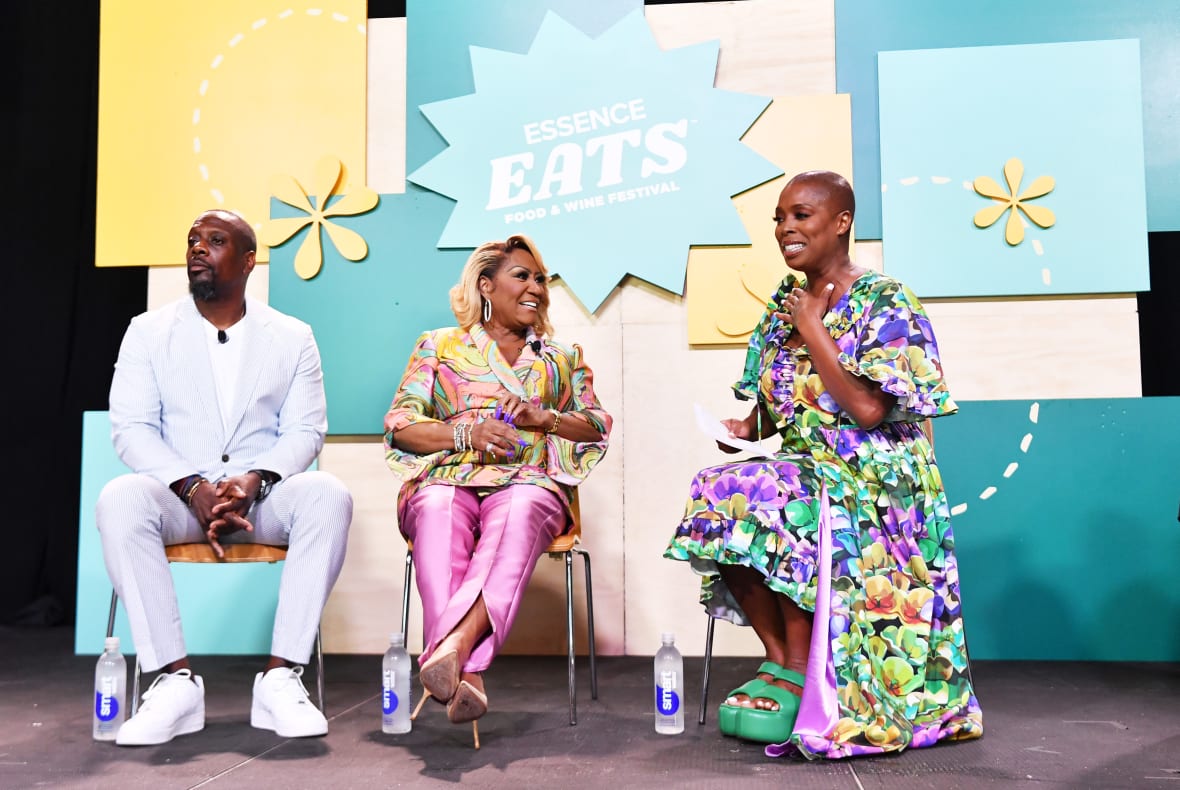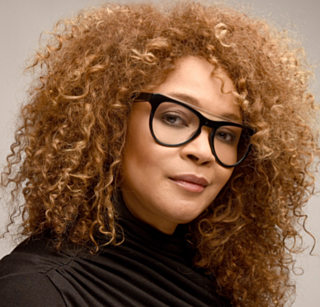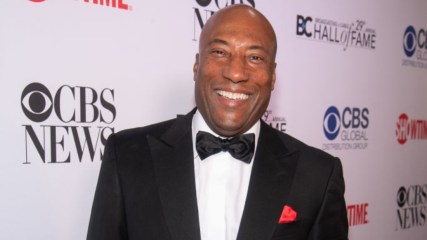Legacy without limits: How Charles Suitt is building an empire for the culture — and his kids
Charles Suitt's career is as compelling as the books he publishes at Simon & Schuster imprint 13A. Here's how the serial entrepreneur is paying it forward and passing it down.
Even if you’ve never heard of Charles Suitt, you’ve likely felt his impact. Perhaps while waxing nostalgic over the Lost Boyz’s now-classic album, “Love, Peace & Nappiness,” or savoring an impossibly delectable bite of Patti LaBelle’s signature sweet potato pie. Or maybe it was while riveted to the pages of Stephen A. Smith’s 2023 bestseller, “Straight Shooter: A Memoir of Second Chances and First Takes.”
Varied as they are, Suitt (pronounced “suit”) has been a driving force behind these hits and many more, steering some of the buzziest albums and product launches to hit the zeitgeist over the past three decades. Now, as Publisher of Simon & Schuster’s imprint 13A, Suitt brings his unique branding savvy to books, signing deals with Smith, Pinky Cole and more.

Though largely behind the scenes, Suitt’s career to date has been nothing short of remarkable. He has traversed industries, participating in events that, in his words, “have stopped the world for a moment” — all while amassing a circle of influence that reads like a who’s who of contemporary Black culture. A conversation with Suitt might be casually peppered with names like Sean Combs, Janet Jackson, Troy Carter and Karen Hunter, just a few of the friends, mentors and colleagues who’ve been integral to his success story. In the process, Suitt has learned to succeed on his terms — and is helping others do the same.
Retracing his incredible journey for theGrio, the serial entrepreneur spoke candidly about ambition, ingenuity and empire-building — and why the legacy he’s creating extends far beyond his children.
Early archetypes
Suitt’s early childhood held hints of the serendipity that would mark his life for years to come. His first memories are as a toddler in foster care, blessed with a series of compassionate-but-temporary guardians before being adopted at age three by Jeanette and Charles Suitt, Jr. Raised between Brooklyn and Long Island, N.Y., Suitt credits his late parents with fueling the drive, determination and intellectual curiosity he now instills in his four children.
“I come from a family [where] my father was a blue-collar worker, and my mother got her master’s at Columbia [University] … And although my father was a blue-collar worker, he read everything,” Suitt said. “[He] was always the smartest guy at the table, whether sitting with doctors or lawyers or whoever, and that was because he was well-read. He read anything that he could put his hands on.”
The younger Suitt was also smart, but confidence was a struggle early on.
“I went to all-white schools growing up, and I’ll never forget studying in class with all these white kids. … I thought that they were richer than us, that they were better than us. I didn’t have enough self-esteem to look them in the eye when I was walking down the street,” he said.
Suitt’s mother urged him to find his power through education, though he was unsure of his purpose.
“My mom used to always say, ‘What are you going to be? Because so-and-so is going to be a lawyer, and so-and-so is going to be a doctor.’ And it always bothered me because I didn’t know. I just knew I wanted to be a businessman,” he explained. “I didn’t know how to say ‘I want to be an entrepreneur’ because that [term] didn’t really exist for a Black man when I was growing up.”
An early glimpse of his future would come when a teenaged Suitt caught an interview with the late Andre Harrell, founder and CEO of Uptown Records, on music media legend Ralph McDaniels’ “Video Music Box.”
“[Harrell] told Ralph McDaniels that MCA [Records] gave him $1 million to start the then-newly formed Uptown Records,” Suitt remembered, reflecting on what seemed a stratospheric sum in the mid-1980s. “To myself, I said, ‘They gave a [Black man] $1 million?’ … I thought he was the richest Black man on the planet.”
However, it was a law degree Suitt initially pursued, attending New York’s St. John University as a political science major before shifting his focus to speech. Also attending The City University of New York, Suitt emerged as an accountant, working for Eli Whitney (now Ernst and Young).
“I’m sitting there, going over these spreadsheets, counting other people’s money, and it was just so boring,” he recalls.
Finding the rhythm
A chance encounter in Atlanta with former college basketball teammate Terrance Kelly, better known as rapper Mr. Cheeks, would prove pivotal.
“He said, ‘It’s funny that I’m bumping into you because I’m looking for a manager,” Suitt recalled. “I loved the way you handled yourself in college. I loved the way you dressed. Why don’t you be my manager?’”
Suitt initially brushed off the suggestion, citing his lack of management knowledge. In response, Kelly, a member of the hip-hop collective Lost Boyz, handed him a book long considered the music industry bible: Donald Passman’s “All You Need to Know About the Music Business.”
“So I read the book from cover to cover that night, and I called him the next day and said, ‘OK, I’m in,’” Suitt said.
In a full-circle moment, the Lost Boyz would end up garnering a demo deal at Uptown, where Suitt says Harrell took some convincing that the group was as viable as label success stories like Heavy D, Soul 4 Real, Jodeci and Mary J. Blige. A series of hit singles, followed by the releases of the gold-certified albums “Legal Drug Money” and “Love, Peace, and Nappiness” would confirm both the Lost Boyz and Suitt as “the real deal.” When Uptown and MCA were absorbed into Universal Music Group, Suitt was on board, launching Universal Records alongside an executive team that included Heavy D, former Motown Records President Kedar Massenburg, and Mark Pitts, then-manager of the Notorious B.I.G. (now at the helm of RCA Records).
“It was just Black Heaven at Universal,” Suitt said of the label that would launch Nicki Minaj and Drake, among others. “We were the fastest upstart record label in history … and we just could not stop making hit records.”
*Record scratch*
Nevertheless, after eight years and in the midst of crafting what would become singer Jojo’s platinum-selling debut, Suitt suddenly found himself without a job after Universal allowed his contract to expire.
“I didn’t understand that,” he said. Close friend Combs put it in perspective, simply telling him, “You stayed too long.”
The experience would mark the start of Suitt’s entrepreneurial career.
“From that point on, I said I’m never, ever going to work for anyone because this doesn’t make sense,” he said.
Rife with risks that often outweigh the rewards, Suitt readily acknowledges entrepreneurial life isn’t for everyone. He’s also the first to admit that his extensive connections made his prospects more promising than most. Fellow music manager Troy Carter, a serial entrepreneur in his own right, encouraged him to leverage those relationships to launch the next phase of his career.
“[He said], ‘You should call up some of those folks and do deals with them and get in business with them,’” Suitt recounted.
His first call was to longtime best friend Zuri Edwards, son and manager of Patti LaBelle. Zeroing in on an untapped market for the legendary songstress, he invited Edwards and LaBelle to his newly opened office.
“When the elevator doors opened, and she came in with her diamonds and her mink coat, I almost got teary-eyed,” he recalls, “Because this woman, who’s a legend, had enough trust in me to come all the way to New York to meet with me.”
The pitch? To create a new product line for the bestselling author of “LaBelle Cuisine,” with LaBelle’s good friend Martha Stewart as the prototype. Laying out photos he and Edwards had taken of Stewart’s Macy’s-based product line, Suitt and then-partner David Kokasis asked LaBelle, “Why don’t you have these things? You are the Black Martha Stewart.”
Beyond a new income stream, the music industry vets knew the opportunity would allow LaBelle to transcend the music industry’s royalty-based system, granting her primary ownership of her products, content, and development. TheGrio’s 2022 Music Icon Award-winner didn’t hesitate, green-lighting the new partnership on the spot.

Edwards and Suitt went to work, creating a product range that spanned hot sauces to bedding, the latter of which was soon sold alongside Stewart’s in Macy’s. And in 2015, the brand scored its biggest break yet: LaBelle’s instantly viral sweet potato pie.
“We broke records with that,” Suitt said, sharing that the pies continue to rake in approximately $100 million annually in Walmart’s bakery department alone. Under the brand umbrella Patti’s Good Life, frozen meals, breakfasts and additional desserts have since followed, with beverages forthcoming. Bolstered by the success, several more celebrity brands are now being developed by the brand’s parent company, ZPAC (an acronym for Zuri, Patti, fellow partner Alex, and Charles).
Turning the page … yet again
With two successful careers and millions in revenue, what prompted Suitt to try his luck in the literary world? Another full-circle moment. Still managing artists, Suitt was seeking a ghostwriter for rapper Sandy “Pepa” Denton’s 2010 memoir when he met Pulitzer Prize-winning journalist Karen Hunter, co-author and ghostwriter of numerous New York Times bestsellers (and now the host of Sirius XM’s “The Karen Hunter Show”). Eager to level up her literary success, she asked Suitt to manage her, as well. His first suggestion? Hunter should have a publishing imprint.
“Charles, they’re never going to give a Black person an imprint,” Suitt recalled her saying. “Definitely not a Black woman.”
Setting up a meeting with Simon & Schuster, Suitt brought his music industry swagger to the table, feeling he had “nothing to lose.” By the close of that meeting, he no longer had Hunter as a client, but as a partner in Karen Hunter Publishing.
“I owe everything to Karen Hunter. She brought me [into] the business, and I never lose sight of that. I wouldn’t be here doing books without Karen Hunter,” Suitt said of “one of the most brilliant women [he’s] ever met.“
By 2021, Suitt was ready to launch an imprint of his own, one with “renowned and relevant Black voices” as its focus. And once again, he was determined not to work for anyone else.
“[O]wnership was extremely important to me; I didn’t want to be Simon & Schuster’s employee,” he explained, adding, “I wanted to be able to speak freely about my culture and my people, respectfully.”
As one of the only Black purveyors of content at the nearly 100-year-old publishing house, Suitt’s newest challenge is multifold: Not only must he sign dynamic Black talent with stories that will drive sales, but he must convince an industry not known for innovation or inclusion to “get it.”
“I’ll be honest; there are other Black folks in the book publishing world at other publishing houses, but they don’t look like me,” Suitt said, praising his partners and team at Simon & Schuster for their faith in his vision. “They don’t come from where I come from. They don’t talk the way I talk. And they’re not tuned into the culture. They happen to have the same skin that I have, but they’re not me.”
Since its launch, 13A has published a 20th-anniversary edition of “LaBelle Cuisine”; Slutty Vegan founder Pinky Cole’s cookbook “Eat Plants, B*tch” debuted to widespread acclaim earlier this year. The imprint’s first memoir, the aforementioned “Straight Shooter,” has been as brashly successful as Stephen A. Smith himself. And the momentum is just beginning: on deck are highly anticipated tomes from Deion Sanders, Nia Long, Wallo Peeples, Allen Iverson, and Tamar Braxton, to name a few.
In short, another prospective string of hits from a well-established hitmaker. So, what is Suitt’s secret sauce?
Aside from using the same discernment with which he spots talent to choose great partners (“Nothing happens without them,” he says): “I think that the reason why I’ve been so blessed is I don’t ever consider myself an expert. I always consider myself a consumer,” Suitt said. “What do I like to watch? What do I like to read? What do I like to listen to? What do I like to eat? What do I like to wear? Once I identify that, I like to go out and create it, make it, or bring it to fruition.”
“This job, it’s a feeling. It’s a job of passion,” he later added. “This is artists and repertoire (A&R) all over again; segueing from music into books, it’s the same thing. And that’s why I feel like I crushed the competition. I feel like there’s nobody that understands the culture [more] because I lived it.”
The moral of the story
After all these years, Suitt has found his purpose and a passion bigger than any of his ventures: his children.
“I’m not specific in the moves that I make, but what I do want to leave in this world is something positive,” he said.
Suitt is particularly strategic in how he models success for his three sons, the eldest of whom just completed his first year at Howard University.
“I want to be the example for them so that they know what the possibilities are,” he said, noting that while he equally cherishes his daughter, “I do this for my sons because I’m raising Black men.”
Having built his career alongside some of the most successful Black men of any generation, Suitt’s faith in Black fatherhood is steadfast.
“This whole rap about ‘Black men aren’t good fathers,’ I don’t see it. All my friends — all of them —would do anything for their kids,” he said.
“What we’re doing and how we’ve set our kids up is mind-blowing; all of my children have an opportunity to go on to college,” said Suitt, excited by the potential to break generational cycles of disenfranchisement in the Black community and create a model of generational wealth.
“I’m creating companies and businesses not just for myself, but for other people to help their families. And I’m teaching other people how to do this; that’s very important to me,” he said proudly.
It’s pride Suitt is now paying forward and passing down.
“Now, when I walk down the street, I teach my kids, ‘You hold your head up. You deserve to be here. You built this country. This city that we’re in, we built this. So when you walk down the street and pass by a white person, you’re no better than him, but you better not look down,'” he said, adding, “’You deserve to be here. … You earned it.’”

Maiysha Kai is theGrio’s lifestyle editor, covering all things Black and beautiful. Her work is informed by two decades of experience in fashion and entertainment, great books, and the brilliance of Black culture. She is also the editor-author of Body: Words of Change series.
TheGrio is FREE on your TV via Apple TV, Amazon Fire, Roku, and Android TV. TheGrio’s Black Podcast Network is free too. Download theGrio mobile apps today! Listen to ‘Writing Black‘ with Maiysha Kai.


